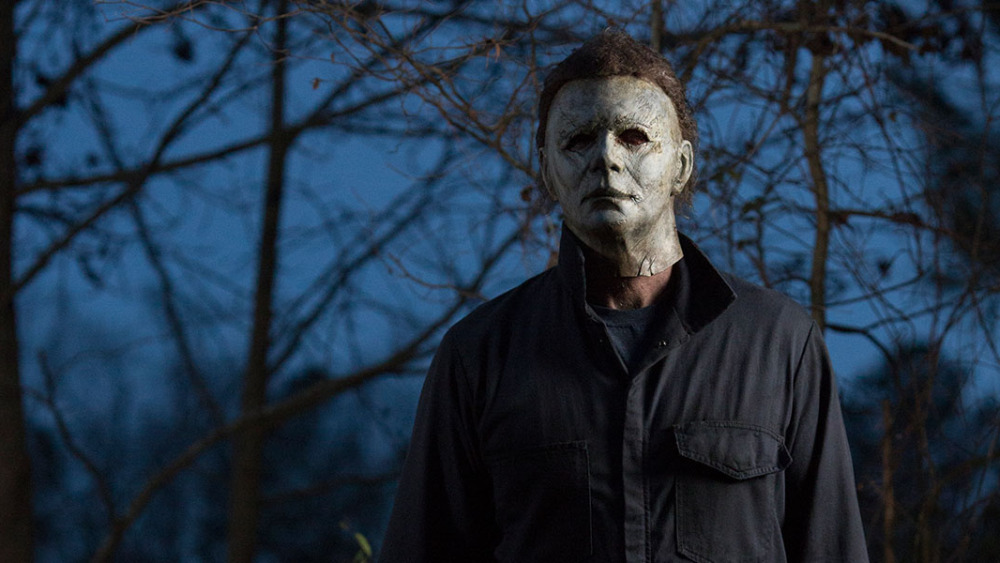For the Final Girl, nothing’s really final.
Laurie Strode might have thought it was game over when a doctor in a raincoat put six holes in the chest of her masked attacker, but Halloween wasn’t even close to done with her. Strapped to the wheel of fate, she was brought back, again and again, for twenty years, enduring more nastiness, more reboots, more bloodline backstory. For survivors, surviving is a full-time job.
For the eleventh film in the franchise, writers Jeff Fradley, Danny McBride and David Gordon Green (who also directs) plunged a butcher’s knife into the heart of the existing canon. Everything after John Carpenter’s 1978 touchstone is dead. No Cult of Thorn; no H20 timeline; no Paul Rudd. All that stuff’s down in the dirt. And what we have instead is… something that looks an awful lot like a Halloween movie.
On thematic and aesthetic levels, the new Halloween prioritises repetition and continuity, using the slasher genre’s evil-never-dies perpetuity to tell a story about how trauma stays with the traumatised.
Forty years after the Babysitter Murders, Laurie (a returning Jamie Lee Curtis) is a paranoid wreck with the survivalist mania of a doomsday prepper. Her secluded home has the fortified exterior and spring-sprung traps of an inventive medieval castle. Her grown-up daughter Karen (Judy Greer) hasn’t really forgiven her for a childhood of sharp shooting and hand to hand combat, and keeps her at arm’s length from grand-daughter Allyson (Andi Matichak), who’s spending Halloween out on the town in costume, prime rib for a serial killer on the lam.
Well-meaning supporting characters coo to Laurie in the key of soft therapy speak, encouraging her to “move on” from the night Michael came home. The film opens with the recluse being visited by two podcasters (sorry, “investigative journalists”) producing an in-vogue true crime show. They want to poke around the murders; provoke new insights; see if they can understand a bit of how Michael Myers’ mind works. The still-mute inmate is being transferred to a proverbial dungeon. Before they throw away the key doesn’t Laurie want to confront him and unburden herself? Doesn’t she want some, you know, closure? She’s the one with the trapdoor in her kitchen, but she looks at her visitors like they’ve lost their mind.
When the transportation bus runs off the road and spills its white gown zombies onto the road, Myers picks up where he left off. When he shivs the podcasters in a truck stop bathroom and steals his mask back, it’s a told-you-so rude awakening and a return to business as usual.
Halloween invokes the approach established by The Force Awakens, Jurassic World and other franchise revivals: a sequel that’s a soft reboot, part fan service, part celebration. From the wonderful jack-o’-lantern credits on, the film is front-loaded with strong visual callbacks to the original, partly a formal expression of Laurie’s stuck-in-time damage, partly a play for in-group validation.
The longer Halloween goes on — much like the original, it’s a brisk runtime — the narrower its ambitious feels. The 1978 film’s subtext of innocence shattered — imagery of bare-breasted teens doused in blood — is invoked but not really worked through. Myers’ return is a vindication of Laurie’s warnings about the reality of evil and the necessity of preparing for it, set against the naive, sort of liberal worldviews of those around her who think horrors don’t really happen, or can at least be analysed and understood.
When the terror hits, there’s the screaming, and the running, and the teens hanging off the wall like high-end decorative gore, but it lacks that disorientating sense of certainties lost that the best horror films run on.
Halloween feels safe. Forty years have seen all sorts of innovations, deviations, meta-variations on the slasher formula. Gordon’s film has been lauded for going back to basics, which is great, but also, as the phrase suggests, a bit basic.
Michael’s melted face floats in and out of Haddonfield’s domestic spaces, knives horny teenagers, and drifts from one victim to the next with a blank, eerie, unstoppable calm. Halloween is competent, inoffensive and solid, given grit and personality by Curtis’ wild-eyed, gun-toting cynic. Curtis’ energy dominates the film, but there was a chance for something morally meatier with her journey from prey to predator.
Halloween’s got treats, but no tricks. Conor Smyth
Halloween is out on wide release.





